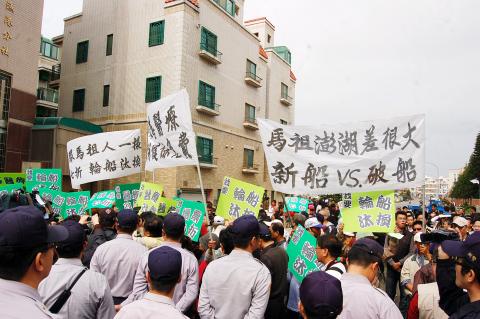On a one-day visit to Penghu, President Ma Ying-jeou (馬英九) yesterday was greeted by protesters who called for fairer treatment from the central government for travel expenses and medical coverage.
Accompanied by Democratic Progressive Party (DPP) county officials, about 100 local residents gathered outside the venue where Ma was having lunch with local dignitaries.
To shouts of “30 percent off [plane] tickets, improve medical care,” Penghu County Councilor Yang Yao (楊曜) of the DPP said Penghu residents could not keep quiet any longer.

PHOTO: LIU YU-CHING, TAIPEI TIMES
“We are taking to the streets because county commissioners, legislators and the president have turned a blind eye to our problems,” Yang said. “We are not asking much. We just want fair treatment.”
Shouting “Let’s use our ballots to support Penghu,” a female protester said Penghu had long been ignored by the central government, adding that Kinmen — another outlying island — has better benefits because it was where the Kinmen Brewery is located.
In response, Ma said his administration should be able to finalize a subsidy program for Taihwa Lun by April. Taihwa Lun is a shipping service partly subsidized by the government to carry passengers between Kaohsiung and Makung (馬公) in Penghu County.
On government subsidies for plane tickets, Ma said that at present the central government subsidizes 20 percent of travel costs, while the local governments, such as Penghu and Kinmen, cover an additional 10 percent.
However, local governments, which have been hit hard by the financial crisis, no longer had the finances to offer the 10 percent subsidy, Ma said.
Non-Partisan Solidarity Union Legislator Lin Pin-kun (林炳坤) is also planning to amend the Civil Aviation Act (民用航空法), Ma said, which would increase government subsidies for Penghu and Kinmen residents flying from certain airports from 20 percent to 30 percent.
Matsu residents receive subsidies of 30 percent and Penghu residents flying from certain airports as well as residents of Orchid Island (蘭嶼) and Green Island (綠島) receive 40 percent subsidies for air travel.
“Everyone concerned is still working to at least increase the subsidy to 30 percent,” Ma said.
Ma also reiterated his government’s resolve to develop Penghu into a low-carbon dioxide emitting island.
He said the Council for Economic Planning and Development had given the green light to the installation of submarine cables between Penghu and Taiwan proper, which would allow residents of Penghu to sell the extra power generated from wind turbines to the Taiwan Power Co.
ADDITIONAL REPORTING BY CNA

Chinese Nationalist Party (KMT) Chairman Eric Chu (朱立倫), spokeswoman Yang Chih-yu (楊智伃) and Legislator Hsieh Lung-chieh (謝龍介) would be summoned by police for questioning for leading an illegal assembly on Thursday evening last week, Minister of the Interior Liu Shyh-fang (劉世芳) said today. The three KMT officials led an assembly outside the Taipei City Prosecutors’ Office, a restricted area where public assembly is not allowed, protesting the questioning of several KMT staff and searches of KMT headquarters and offices in a recall petition forgery case. Chu, Yang and Hsieh are all suspected of contravening the Assembly and Parade Act (集會遊行法) by holding

PRAISE: Japanese visitor Takashi Kubota said the Taiwanese temple architecture images showcased in the AI Art Gallery were the most impressive displays he saw Taiwan does not have an official pavilion at the World Expo in Osaka, Japan, because of its diplomatic predicament, but the government-backed Tech World pavilion is drawing interest with its unique recreations of works by Taiwanese artists. The pavilion features an artificial intelligence (AI)-based art gallery showcasing works of famous Taiwanese artists from the Japanese colonial period using innovative technologies. Among its main simulated displays are Eastern gouache paintings by Chen Chin (陳進), Lin Yu-shan (林玉山) and Kuo Hsueh-hu (郭雪湖), who were the three young Taiwanese painters selected for the East Asian Painting exhibition in 1927. Gouache is a water-based

Taiwan would welcome the return of Honduras as a diplomatic ally if its next president decides to make such a move, Minister of Foreign Affairs Lin Chia-lung (林佳龍) said yesterday. “Of course, we would welcome Honduras if they want to restore diplomatic ties with Taiwan after their elections,” Lin said at a meeting of the legislature’s Foreign Affairs and National Defense Committee, when asked to comment on statements made by two of the three Honduran presidential candidates during the presidential campaign in the Central American country. Taiwan is paying close attention to the region as a whole in the wake of a

OFF-TARGET: More than 30,000 participants were expected to take part in the Games next month, but only 6,550 foreign and 19,400 Taiwanese athletes have registered Taipei city councilors yesterday blasted the organizers of next month’s World Masters Games over sudden timetable and venue changes, which they said have caused thousands of participants to back out of the international sporting event, among other organizational issues. They also cited visa delays and political interference by China as reasons many foreign athletes are requesting refunds for the event, to be held from May 17 to 30. Jointly organized by the Taipei and New Taipei City governments, the games have been rocked by numerous controversies since preparations began in 2020. Taipei City Councilor Lin Yen-feng (林延鳳) said yesterday that new measures by